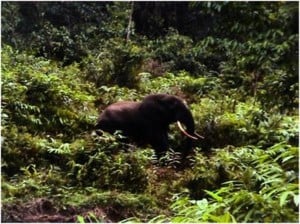
High level of endangered endemic plant and animal species present in South West of Cameroon, are increasingly being isolated due to continuous habitat fragmentation and increased forest destruction and deterioration. As a result of all of these, the already threatened species are disproportionately affected because they cannot respond quickly to the altered spatial configuration of the habitat. The Small populations are at increased risk of a variety of genetic consequences that influence their long-term survival. These sub-populations may be too small to be viable or, if local extinction of species occurs, fragmentation cuts off the potential for repopulation since there are no intact populations nearby. (CBIN 1998). The key species present are the Forest elephants ( Loxodonta cyclotis), Nigeria-Cameroon Chimpanzees (Pan troglodytes ellioti), Cross River Gorillas (Gorilla gorilla dielhi), the crown monkey (Cercopithecus pogonias) threatened endemic amphibians (e.g. Conraua goliath), birds (Turaco bannermani) and endemic threatened tress (Prunus africana)
This situation therefore calls for urgent creation of a conservation corridor linking Mt. Cameroon and Mokoko Forest Reserve, FMU 11002 and Mak-Betchou (all protected areas), to ensure genetic connectivity, easy migration of species and the long term survival of the species. Specifically,
The main objective of the project is to create and manage corridors in the Lebialem Highlands Conservation Complex for genetic connectivity and migratory pattern of wildlife species. Other objectives will include;
Identify land use patterns within the corridors and protected areas.
Conduct transects and recce surveys in order to determine the densities or relative densities of key wildlife species and anthropogenic activities in the corridors and Protected areas.
Map out biodiversity hotspots of key wildlife, spatial distribution of anthropogenic activities and their migration patterns within the corridors (gene flow).
The expected outcome of this projects will include:
1. Easy migration between species, hence, ensuring genetic connectivity.
2. Healthy ecosystem
3. Sustainable management of the forest estate.
Based on her decades of experience in the protected area creation, management and conservation especially in facilitating the creation of the Tofala Hill Wildlife Sanctuary, advocating the creation of the proposed Mak-Betchou wildlife Sanctuary and other conservation corridors, the Environment and Rural Development Foundation (ERuDeF), is proposing a 3 year funding of US$2,500,000 for the implementation of the project.
US$1,000,000 will be used to create and manage corridors in the Lebialem Highlands Conservation Complex for genetic connectivity and migratory pattern of wildlife species,
US$ 100,000 will be used to Conduct transects and recce surveys in order to determine the densities or relative densities of key wildlife species and anthropogenic activities in the corridors and Protected areas.
Finally US$500,000 will be used to Map out biodiversity hotspots of key wildlife, spatial distribution of anthropogenic activities and their migration patterns within the corridors (gene flow).
For more information, please go to www.erudef.org
Your timely contribution will not only create conservation corridors to help unite small population species whose long term survival is threatened because of isolation, but will also help conserve our already very fragile ecosystem.



